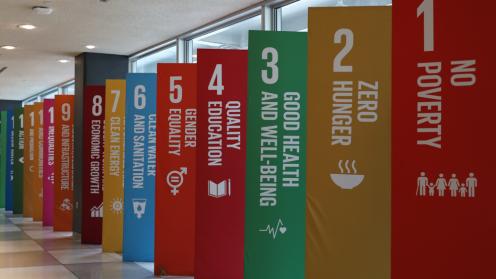By Haruna Gimba
Government, civil society and private sector partners convened in New York on Monday by the Economic and Social Council (ECOSOC) to address the urgent need to put the 17 Sustainable Development Goals (SDGs) back on track.
The ambitious set of objectives agreed in 2015 for people and planet have been derailed by the COVID-19 pandemic and escalating global crises.
Since the adoption of the 2030 Agenda the world has undergone significant changes, and progress towards the SDG is falling behind due to financial, energy, food, and humanitarian setbacks exacerbated by geopolitical tensions.
The High-Level Political Forum on Sustainable Development (HLPF), takes place at the mid-point in pursuit of the 2030 Agenda. Focusing on ways to accelerate the global recovery, it will set the grounds for the crucial SDG Summit scheduled for September 2023.
Addressing the HLPF’s opening session, Ms. Lachezara Stoeva, Bulgaria’s representative to the UN and current President of ECOSOC, described this annual HLPF as “the opportunity to build political momentum for the Summit, as well as identify key policy priorities to be addressed.”
The Forum will be basing its work on two key documents: the 2023 Global Sustainable Development Report and the Special Edition of the Secretary-General’s SDG Progress Report.
The Forum will as ever, conduct in-depth reviews of several Sustainable Development Goals. This time there will be dedicated sessions scrutinizing SDG 6 on clean water and sanitation; SDG 7 on affordable and clean energy; 9 on industry, innovation and infrastructure; 11 on sustainable cities and communities, and 17 on partnerships for the Goals, and the ways they all interlink.
Besides checking the general flow of the SDGs’ implementation, the Forum participants will take a close look at what help should be provided to the countries with specific needs in achieving the Goals, including small island development states and African counties.
A special effort, the ECOSOC President noted, would be made to “include the voices of youth in our deliberations”. “We need their wisdom, energy and dedication to confront the challenges we are facing,” she explained.
It is impossible to track the course of SDG’s unless solid data from countries is received. That’s why the Voluntary National Reviews (VNRs) prepared by individual states are at the heart of SDG implementation, review, and follow-up.
“These reports reflect the pulse of the 2030 Agenda. Each year they highlight progress, challenges and obstacles in implementing the agenda,” said the ECOSOC President.
The Forum will hear from 39 countries as they present their VNRs. For the first time ever, the European Union will present its report, which Ms. Stoeva called “a watershed moment for both the EU and the HLPF.”
Over the ten days of the Forum with its programme packed with over 200 official meetings and side-events, participants of the HLPF will consider the accelerated implementation of the 2030 Agenda in all its aspects.
“This is the objective of our deliberations this year, and we must not lose sight of it,” encouraged Ms. Stoeva told delegates.




